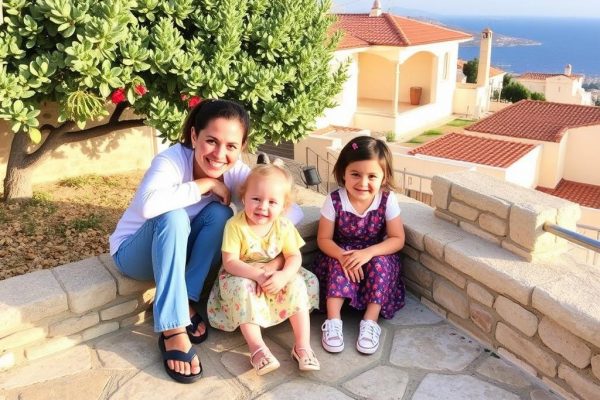The challenge of caring for elderly parents is one that many families face worldwide, and Cyprus is no exception. With a growing aging population and shifting family dynamics, the demand for effective senior support Cyprus has increased significantly. For families navigating the complexities of elderly care Cyprus, understanding available resources, medical options, and social support networks is essential. This article presents a comprehensive guide to the various elder services and geriatric care Cyprus offers, focusing on practical solutions and realistic expectations for those supporting aging parents Cyprus.
Demographic Trends and the Need for Elderly Care in Cyprus
Cyprus, like many developed nations, is experiencing demographic shifts driven by increased life expectancy and declining birth rates. This results in a larger proportion of older adults requiring assistance at home or within community facilities. The 2021 census highlighted a steady rise in residents over the age of 65, underscoring an urgent need for enhanced geriatric care Cyprus infrastructure.
Instead of relying solely on traditional family-centered care, modern elderly care Cyprus blends professional health services with community involvement. The increased presence of nuclear families and a higher number of women participating in the workforce mean that elderly care can no longer be managed informally on a large scale. This shift drives demand for formalized senior support Cyprus, integrating medical care, social assistance, and technological aids to improve quality of life for seniors and their families.
As Cyprus ages, the need for coordinated elderly care systems that combine health, social, and familial support becomes increasingly critical.
Understanding these demographic trends is key to developing realistic strategies for aging parents Cyprus. Caregivers need access to specialized services adaptable to different health profiles, social habits, and personal preferences. Equally important is governmental and community backing to ensure elder services are both accessible and affordable.
Types of Elderly Care Services Available in Cyprus
Elderly care Cyprus covers a spectrum of services designed to meet varied levels of senior needs. These can be broadly categorized into home care, community-based programs, residential care, and specialized medical services. Awareness of these categories helps families make informed decisions tailored to the unique context of each aging parent Cyprus.
Home-Based Elder Services
Home care remains the preferred option for many seniors who value independence and familiarity. Elder services in the form of home nursing, personal care aids, and domestic assistance are widely available across Cyprus. These services range from basic companionship and help with daily tasks to advanced nursing care for chronic conditions.
Home health aides and visiting nurses who provide geriatric care Cyprus often support families by managing medications, wound care, and rehabilitation therapies. Additionally, some companies offer emergency monitoring and telehealth solutions, integrating technology with compassionate care.
Community and Day Care Centers
Community centers offer daytime programs designed to engage seniors socially and physically. These centers provide meals, fitness classes, cognitive activities, and short-term respite care. Many incorporate health screenings and educational workshops on managing chronic illnesses.
Such senior support Cyprus programs help reduce feelings of isolation, promote mental well-being, and allow family caregivers some relief during working hours. Importantly, these facilities help maintain seniors’ routines and social networks, which are critical to successful aging.
Residential Care Facilities
For those requiring more comprehensive support, residential care facilities including nursing homes and assisted living communities provide 24/7 supervision and medical care. These institutions accommodate seniors with complex health issues or those who can no longer live independently.
The quality of geriatric care Cyprus in these institutions varies widely, prompting families to carefully evaluate staffing qualifications, care plans, and reputations before placement. Many facilities now emphasize person-centered care models aiming to preserve dignity and autonomy despite clinical needs.
| Type of Elder Service | Description | Typical Users | Benefits |
|---|---|---|---|
| Home Care | Personal and medical assistance provided at the senior’s home | Mobile seniors with some assistance needs | Maintains independence, comfort of familiar environment |
| Day Care Centers | Community programs with social, physical, and health activities | Seniors needing socialization and light monitoring | Reduces isolation, caregiver respite |
| Residential Care | 24/7 residential care offering medical and personal support | Seniors with significant health or mobility challenges | Comprehensive care, safety, structured routines |
Choosing the right type of elder services requires balancing medical needs, personal preferences, and family resources.
Government and Non-Governmental Elder Services in Cyprus
The Cypriot government plays a vital role in facilitating access to elder services. Through its Ministry of Labour, Welfare and Social Insurance, various programs and subsidies target elderly care Cyprus, particularly for low-income seniors and those with disabilities. The Social Welfare Services department coordinates community outreach, home support, and residential care funding.
Notably, the government funds a network of public nursing homes and day centers which are more affordable than private counterparts. Still, waiting lists can be lengthy, and some facilities face challenges related to infrastructure and staffing.
In addition to public services, many NGOs and charitable organizations contribute significantly to senior support Cyprus. These groups often fill gaps in coverage by providing social visits, meals on wheels, and advocacy for elder rights. Organizations like the Cyprus Association of Gerontology and Geriatrics promote awareness about aging and offer educational resources for families.
Financial Support and Subsidies
One of the key concerns in geriatric care Cyprus is affordability. To alleviate cost barriers, government programs offer long-term care allowances, disability benefits, and healthcare subsidies for seniors. Eligibility often depends on income level, health status, and family situation.
Private health insurance also plays a role in extending elder services, especially for access to private clinics and home care providers. However, many Cypriots still rely heavily on out-of-pocket payments, which can limit options for some families.
Collaboration between government bodies and NGOs creates a layered support system that enhances elder care accessibility across Cyprus.
Medical and Specialized Geriatric Care Options
Medical needs for aging parents Cyprus range from routine checkups and chronic disease management to specialized geriatric care Cyprus resources such as physiotherapy, dementia care, and palliative services. The increasing prevalence of conditions like Alzheimer’s disease necessitates access to tailored clinical expertise and support networks.
Geriatricians and specialized geriatric nurses in Cyprus provide assessments that address complex interactions between multiple health issues common in older adults. These professionals recommend individualized care plans that incorporate medication management, rehabilitation therapies, and nutritional guidance.
Physiotherapy and occupational therapy services are integral to maintaining mobility and independence, aiming to prevent falls and promote safe daily activities. Several hospitals and private clinics offer comprehensive geriatric assessments, often coordinating closely with home care providers to ensure seamless care transitions.
Palliative care, focusing on quality of life for seniors with advanced illness, is an emerging priority in Cyprus. Hospice services now operate in some regions, combining pain management with emotional and spiritual support for patients and families.
Technological Innovations in Elder Care Cyprus
Technological advancements are becoming part of the geriatric care Cyprus landscape to improve monitoring and timely responses. Remote health monitoring devices, emergency alert systems, and telemedicine consultations enable caregivers to detect issues early and reduce hospital readmissions.
While technology cannot replace human interaction, these tools complement elder services by enhancing safety and allowing aging parents Cyprus to remain more independent longer. Government initiatives have encouraged the integration of such technologies, but digital literacy and access disparities remain challenges.
Specialized medical care combined with innovative technology forms the backbone of advanced geriatric care in Cyprus, improving outcomes for complex elderly cases.
Family Involvement and Caregiver Support Strategies
The role of family caregivers is pivotal when providing elderly care Cyprus. Emotional support, advocacy, and coordination with professional services frequently fall on relatives. However, caregiving can be physically and mentally taxing, necessitating resources to assist families in this vital work.
Support groups, counseling, and training programs on elder care best practices are increasingly available to help caregivers cope with stress and develop necessary skills. Psychological resilience and self-care are essential to sustain caregiving roles over time and ensure positive interactions with aging parents Cyprus.
Communication between family caregivers and healthcare providers forms a crucial interface for monitoring health changes, managing medications, and adjusting care plans. Additionally, legal and financial planning advice supports families in navigating issues like inheritance, powers of attorney, and long-term care costs.
Balancing Cultural Expectations with Modern Realities
Culturally, Cyprus places strong emphasis on family responsibility towards elderly members. Traditionally, caring for aging parents Cyprus was an exclusively family matter, but contemporary workloads and lifestyles complicate this expectation.
Recognizing the need to blend traditional values with available elder services is important. Families benefit from openly discussing care preferences, exploring external support options, and sharing responsibilities to sustain quality care without excessive burden on any one member.
Effective caregiving involves striking a balance between cultural respect and practical support frameworks to optimize elderly care outcomes.
The Future of Senior Support and Elder Services in Cyprus
As demographic projections indicate continued growth in the senior population, Cyprus faces significant challenges and opportunities in enhancing geriatric care Cyprus. Investments in healthcare infrastructure, workforce training, and caregiver support will be essential to meet increasing demand.
Policy developments aim to improve integration of services, creating more comprehensive care networks that respond flexibly to individual needs. Emphasis on preventive care, health promotion, and technology adoption are seen as crucial steps forward.
Public awareness campaigns seek to de-stigmatize aging and encourage proactive planning among citizens. Equally, ongoing research into age-related diseases fosters improvements in clinical protocols and personalized interventions.
The active involvement of local communities, private sector innovation, and international collaboration position Cyprus to build a geriatrics care model that combines quality, accessibility, and sustainability.
The future of elderly care Cyprus depends on innovation, policy foresight, and a community-driven approach to support every aging parent effectively.
Taking Charge of Care: Empowering Families and Communities
Ultimately, caring for elderly parents in Cyprus requires a comprehensive understanding of the available support services and an informed approach to decision-making. The evolving landscape of elder services, from home-based care to specialized medical interventions, offers multiple pathways to tailor support around individual needs.
Families navigating aging parents Cyprus benefit from a mindset that embraces both modern resources and cultural values. This empowers caregivers to create balanced care plans that respect seniors’ dignity, ensure safety, and foster well-being.
Engaging proactively with government programs, community initiatives, and technological tools strengthens resilience and optimizes outcomes for all involved. By leveraging the diverse options of elderly care Cyprus, communities can transform aging into a positive life stage marked by comfort, respect, and connection.
This ongoing commitment to improvement and collaboration reflects the core of effective senior support Cyprus and sets a hopeful direction for the future.
Frequently Asked Questions
- What types of elder services are commonly available in Cyprus?
Elder services in Cyprus typically include home care, day care centers, and residential care facilities, each catering to different levels of senior needs. - Are there financial subsidies for elderly care in Cyprus?
Yes, the Cypriot government provides financial support and subsidies for long-term care, particularly targeted at low-income seniors and those with disabilities. - How can families access specialized geriatric care in Cyprus?
Specialized geriatric care is accessible through hospitals, private clinics, and geriatricians who offer comprehensive assessments and tailored care plans. - What role do community centers play in senior support Cyprus?
Community centers offer day programs that provide social interaction, health monitoring, and activities to improve seniors’ quality of life and reduce isolation. - How is technology used in elderly care in Cyprus?
Technologies such as remote monitoring, emergency alert systems, and telemedicine are increasingly integrated to enhance safety and medical responses for seniors. - What support exists for family caregivers in Cyprus?
Caregivers have access to training programs, support groups, counseling, and sometimes respite services to help manage the demands of elder care. - Are there cultural considerations in caring for aging parents in Cyprus?
Yes, cultural expectations emphasize family responsibility, but modern lifestyles often require combining family care with formal elder services to provide sustainable support.





